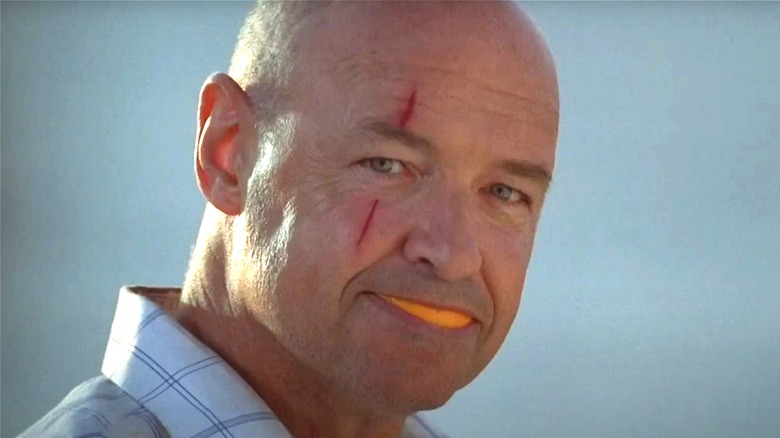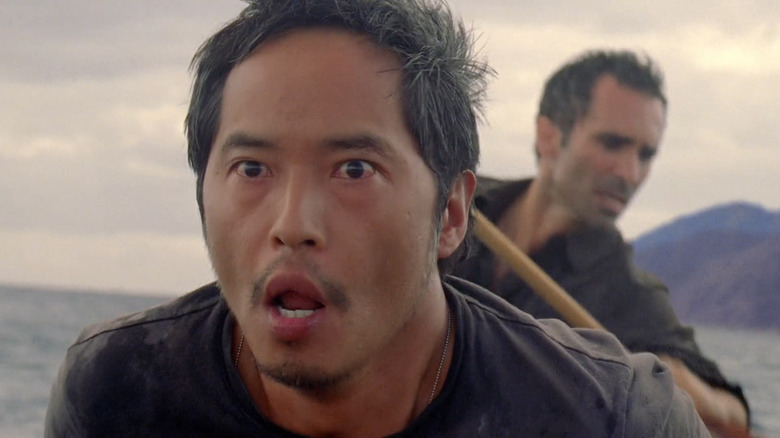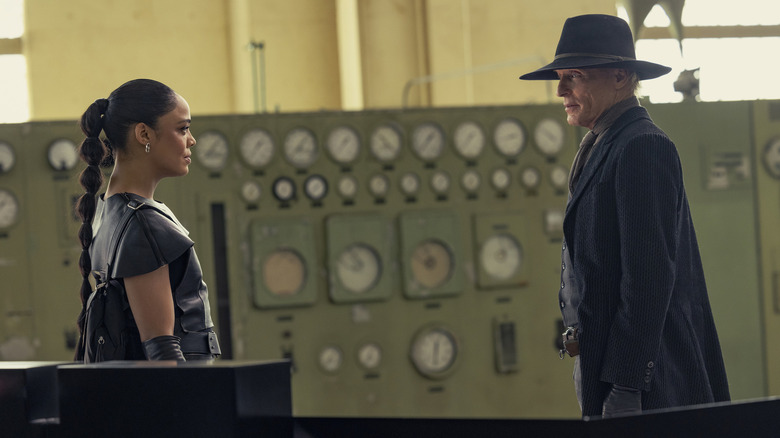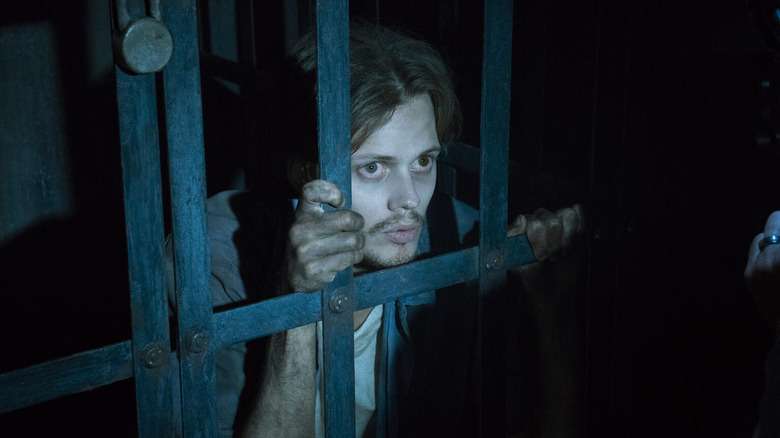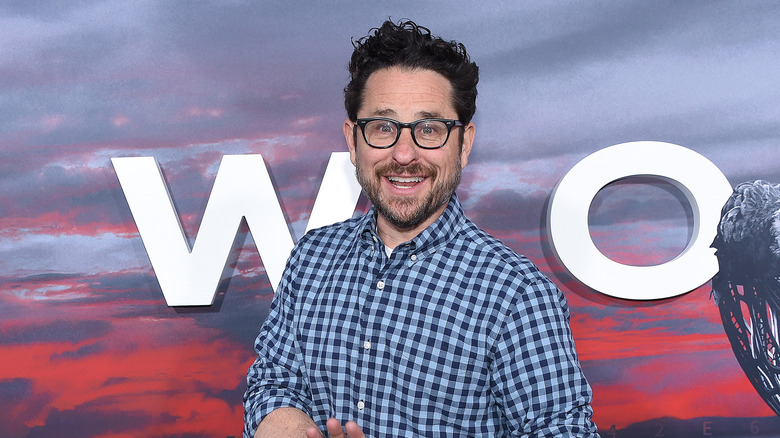Every J.J. Abrams Show Has The Exact Same Problem
With successive mindbending shows that many claim redefined the medium of television, J.J. Abrams rose to prominence in the early 2000s. Even today, people still discuss "Lost," his speculative series about a group of plane crash survivors stuck on an island. The series was so celebrated that it unlocked the doors of major studio filmmaking to the young writer and director. He has since directed "Mission: Impossible III," two "Star Trek" films, and two "Star Wars" films. Meanwhile, he's kept busy on the television side by taking up the position of executive producer on series including "Westworld," "Castle Rock," and "Lovecraft Country," all adaptations of literary works.
But the further Abrams progresses in his career, the clearer it becomes that the projects he's creatively involved with, particularly when it comes to TV shows, share a unifying, frustrating fatal flaw. For all their pomp and circumstance, all their wild twists and edge-of-your-seat moments, his television shows tend to look pretty and say ... nothing at all. Each time they arrive at the brink of making a meaningful statement via their themes and ideas, they pull back from the brink of greatness. Like Indiana Jones at the start of "Raiders of the Lost Ark," they swap gold for worthless weight, hoping nobody will notice the difference.
That's not to rob many of his shows of the praise they deserve. They are often captivating works and almost unerringly pretty on an aesthetic level. But when they fall short, they fail to live up to their own standards.
J.J. Abrams gets Lost in the details
It's impossible to fully discuss Abrams' work without discussing what remains his most impactful solo effort: "Lost." The series debuted at the dawn of what's now referred to as the "golden age of television" or simply "peak TV," and it was among the headiest shows on offer at the time. Alongside Damon Lindelof and Jeffery Lieber, Abrams told the story of a plane crash that leaves survivors scattered across a mysterious island whose inhabitants appear to be supernatural entities, along with hostile islanders known as the Others.
A lot of ink has been spilled regarding the divisive finale of "Lost," which is variously considered the worst ending of all time or just fine, depending on who you talk to. There's no need to rehash it here all these years later, and there have certainly been worse endings in TV history (looking at you, "Game of Thrones"). But Rotten Tomatoes has Season 6 of "Lost" pegged at a 69% critics' rating, proving that it didn't land for everyone. After six seasons of complex narratives that raised questions about the nature of good and evil, as well as the human capacity for both, it turned out everyone had been dead the whole time ... or not, depending on who you ask. There's a reason people are still debating this.
This is the gambit Abrams often makes. He sets up elaborate themes that often cut to the very question of human nature itself, making audiences feel like they're on a journey toward profundity. But just when the journey comes to an end and a thesis statement seems to be in sight, his TV shows end with a noncommittal shrug.
J.J. Abrams' TV shows after Lost share its confusing DNA
Much ado has been made of Abrams' notorious "mystery box" approach to storytelling, in which he writes complex mysteries without knowing the solution ahead of time. But that inability to deliver on a premise is not purely a mechanical one. Projects Abrams has involved himself with all share a baffling lack of thematic depth. They are stories that announce themselves as having something important to say, only to fall back on complex narratives as a way of masking the fact they say nothing at all. Often, watching the shows he's attached himself to feels like grading a paper written by a student who knows big words but hasn't read the assigned book.
Take "Westworld" as a prime example. Abrams executively produced the prestige Michael Crichton adaptation for HBO, following a Western theme park full of lifelike robots who customers are allowed to abuse and even kill for kicks until the Hosts begin to take on autonomy of their own. Here is a premise ripe with the questions central to science fiction: what constitutes life and consciousness? what are people capable of when they see others as less than human? how do we make that determination? All of these are questions "Star Trek" has been able to reach conclusions on in hour-long episodes with time left over for a B-plot, but "Westworld" instead spirals into endless metanarrative layers, circling its central questions but never attempting to answer them. In place of any declarative statement or substantive discussion, "Westworld" opts for lipstick on a pig in the form of expensive sets and aesthetically pleasing camera techniques. It's like a residential garden: once you dig beneath the surface, you find a plastic tarp.
Some J.J. Abrams shows have more to say than others
To be clear, the blame for "Westworld" cannot be laid squarely at Abrams' feet. Warner Bros. Discovery canned "Westworld" ahead of its planned final season, which may have finally unraveled the Gordian knot of its narrative. But by all accounts, he had an outsized influence on the series and was the one who pitched it to showrunner Jonathan Nolan. And when compared to Abrams' other TV series, we always find the same issue to one degree or another.
Two Abrams shows almost dodge the problem entirely. The first is "Castle Rock," a Hulu Original collaboration between Abrams and Stephen King, both attached as EPs. The horror series gives its characters more room to breathe as they uncover the dark secrets of the fictional Maine town, but is also wary of making waves. As critic Daniel Feinberg put it in his review for The Hollywood Reporter, "It's all Easter eggs, no Easter dinner."
It would be a disservice not to mention "Lovecraft Country," the unfortunately short-lived horror series starring Jonathan Majors. The first and only season was unflinching when discussing racial identity in America, following a WWII veteran (Majors) who leaves behind the horrors of war only to discover those awaiting him at home. But as the season progresses, it becomes concerned with plot mechanics that eventually drown the urgent social critique its early episodes hammer home. Compared to "Watchmen," another HBO show helmed by "Lost" co-creator Damon Lindelof which debuted near it and shared many of the same themes, "Lovecraft Country" comes up wanting.
So it goes across Abrams' TV. The trees are lost for the forest, and the forest is set on fire to drive audience excitement, obscuring any hint of meaning behind a choking layer of smoke.
Abrams probably won't change his approach — and doesn't need to
There's nothing forcing Abrams to change his approach, especially when he's clearly got a recipe for success. You don't get to direct movies from the two biggest franchises with "Star" in their titles if you haven't proven yourself able to draw in massive audiences. And in 2020, he signed an overall deal with Warner Bros., the first effort from which will be an upcoming crime thriller series called "Duster" on Max. It began production in April of this year, which was halted by the ongoing Writers Guild of America strike. According to The Hollywood Reporter, "Duster" is about the first Black FBI agent (Rachel Hilson) and her attempts to bring down an organized crime ring with the help of a "getaway driver" (Josh Holloway).
If that sounds refreshingly less convoluted than previous Abrams projects, well, it might be. Sans an elaborate sci-fi or horror premise, a cop show can get pretty nutty, but at least we won't have to keep track of who's actually a human, especially since "Duster" is reportedly set in 1970s America.
The question for "Duster" and other future Abrams TV projects is whether they'll stay with us, or merely dazzle us in the moment. Will they be pretty facades without much meaning, or will they aim for a depth that has been sadly missing from his previous efforts? Oscar Wilde once wrote, "Those who go beneath the surface do so at their peril." Just how much peril is Abrams willing to put himself in?
